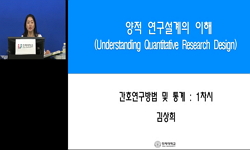본 연구는 특수체육의 다양성과 특이성을 반영하고 연구의 과학적 경험적 근거를 명확히 하는데 더욱 적절 하다고 판단되는 혼합 연구방법론의 특성과 개념적 정의를 살펴보고 특수체육연...
http://chineseinput.net/에서 pinyin(병음)방식으로 중국어를 변환할 수 있습니다.
변환된 중국어를 복사하여 사용하시면 됩니다.
- 中文 을 입력하시려면 zhongwen을 입력하시고 space를누르시면됩니다.
- 北京 을 입력하시려면 beijing을 입력하시고 space를 누르시면 됩니다.

특수체육 연구에서 혼합 연구방법론 적용 사례와 향후 발전을 위한 탐색 = An Investigation of the Applicability of Mixed Methods Research to Adapted Physical Education
한글로보기https://www.riss.kr/link?id=A100327922
- 저자
- 발행기관
- 학술지명
- 권호사항
-
발행연도
2012
-
작성언어
Korean
- 주제어
-
KDC
692.379
-
등재정보
KCI등재
-
자료형태
학술저널
- 발행기관 URL
-
수록면
17-29(13쪽)
-
KCI 피인용횟수
3
- DOI식별코드
- 제공처
-
0
상세조회 -
0
다운로드
부가정보
국문 초록 (Abstract)
본 연구는 특수체육의 다양성과 특이성을 반영하고 연구의 과학적 경험적 근거를 명확히 하는데 더욱 적절 하다고 판단되는 혼합 연구방법론의 특성과 개념적 정의를 살펴보고 특수체육연구에서 혼합 연구의 적용사례 와 향후 발전 가능성을 탐색하는데 그 목적이 있다. 이를 위하여 양적 연구, 질적 연구, 혼합 연구의 특성을 비 교 검토, 혼합 방법 연구의 개념적 정의에 관한 유사 개념들과의 비교 및 고찰, 특수체육연구에서의 적용사례와 활용가능성에 대한 탐색을 시도하였다. 본 논문의 연구내용으로 다음과 같이 세 가지 주제를 선정하였다. 첫째, 대표적인 연구 접근법으로 양적 연구, 질적 연구, 혼합 방법 연구를 다양한 관점에서 비교 설명하였다. 둘째, 최근 대두되고 있는 혼합 연구의 다양한 명칭과 정의, 사용 목적에 관하여 살펴보았다. 셋째, 특수체육학계의 2000년 이후의 연구물을 연구방법 면에서 질적 연구와 양적 연구의 추이를 분석하면서, 혼합 방법을 사용한 연 구들을 혼합 방법 연구의 방법론 관점에서 검토하였다. 본 연구는 새로이 대두되고 있는 혼합 연구의 성격을 명확히 하고, 연구방법론의 가능성과 토대를 제공하는데 기여할 것으로 생각한다.
다국어 초록 (Multilingual Abstract)
The purpose of this article was to investigate the applicabilities of the mixed methods research in adapted physical education to respond the diversity and uniqueness of the field and to satisfy the requirement of science based research. For this purp...
The purpose of this article was to investigate the applicabilities of the mixed methods research in adapted physical education to respond the diversity and uniqueness of the field and to satisfy the requirement of science based research. For this purpose, three major issues were discussed. First, various characteristics in three representative research methods such as qualitative, quantitative, and mixed methods research have been investigated. Second, definitions and purposes of the emerging mixed methods research have been reviewed. Thirdly, research trend on methodology and quality of mixed methods research in adapted physical education have been analyzed. And finally it is suggested that continuing dialog in open forum will develop the better understanding of mixed methods research in the field of adapted physical education.
참고문헌 (Reference)
1 이현수, "한국과 미국의 특수체육 연구동향 비교분석(2006-2010): APAE와 APAQ를 중심으로" 한국특수체육학회 19 (19): 63-74, 2011
2 이현수, "한국과 미국의 특수체육 연구동향 비교분석(2001-2005): APAE와 APAQ를 중심으로" 한국체육학회 45 (45): 505-514, 2006
3 강유석, "특수체육학 분야의 질적연구 동향 고찰" 한국특수체육학회 17 (17): 285-310, 2009
4 이경준, "특수체육 질적연구 패러다임들의 기여와 한계" 한국특수체육학회 19 (19): 83-101, 2011
5 이인경, "특수교육 연구에서 혼합방법 연구의 활성화를 위한 기초 담론: 패러다임 혼용의 문제" 국립특수교육원 19 (19): 130-154, 2012
6 임성철, "통합체육의 사각지대(死角地帶)Ⅱ: 통합체육 수업개선을 위한 실행연구" 한국체육학회 45 (45): 109-120, 2006
7 이경준, "통합체육의 사각지대(死角地帶)Ⅰ: 통합체육의 실현가능성" 한국체육학회 45 (45): 93-108, 2006
8 염시창, "통합연구방법론 : 질적 양적 접근방법의 통합" 학지사 2001
9 이인경, "질적연구 담금질을 시작하며......" 한국특수체육학회 14 (14): 61-86, 2006
10 조용환, "질적 연구와 양적 연구, In 교육에서의 질적 연구" 교육과학사 3-22, 1998
1 이현수, "한국과 미국의 특수체육 연구동향 비교분석(2006-2010): APAE와 APAQ를 중심으로" 한국특수체육학회 19 (19): 63-74, 2011
2 이현수, "한국과 미국의 특수체육 연구동향 비교분석(2001-2005): APAE와 APAQ를 중심으로" 한국체육학회 45 (45): 505-514, 2006
3 강유석, "특수체육학 분야의 질적연구 동향 고찰" 한국특수체육학회 17 (17): 285-310, 2009
4 이경준, "특수체육 질적연구 패러다임들의 기여와 한계" 한국특수체육학회 19 (19): 83-101, 2011
5 이인경, "특수교육 연구에서 혼합방법 연구의 활성화를 위한 기초 담론: 패러다임 혼용의 문제" 국립특수교육원 19 (19): 130-154, 2012
6 임성철, "통합체육의 사각지대(死角地帶)Ⅱ: 통합체육 수업개선을 위한 실행연구" 한국체육학회 45 (45): 109-120, 2006
7 이경준, "통합체육의 사각지대(死角地帶)Ⅰ: 통합체육의 실현가능성" 한국체육학회 45 (45): 93-108, 2006
8 염시창, "통합연구방법론 : 질적 양적 접근방법의 통합" 학지사 2001
9 이인경, "질적연구 담금질을 시작하며......" 한국특수체육학회 14 (14): 61-86, 2006
10 조용환, "질적 연구와 양적 연구, In 교육에서의 질적 연구" 교육과학사 3-22, 1998
11 김권일, "장애아동의 신체활동 참여과정과 부모의 양육 태도 및 스트레스, 생활만족도에 관한 연구" 서울대학교 대학원 2006
12 강윤수, "연구설계 : 정성연구, 정량연구 및 혼합 연구에 대한 실제적 접근" 교우사 2010
13 최재천, "다윈 지능" 사이언스북스 2012
14 이석명, "노자와 장자" 도서출판 길 2003
15 김용욱, "노자와 21세기" 통나무 2000
16 김민수, "금성판 국어대사전" 금성출판사 1991
17 김영천, "교육연구에서의 통합연구방법(Mixed Research Methods) : 개념과 시사점" 한국초등교육학회 24 (24): 305-328, 2011
18 이용숙, "교육에서의 질적 연구" 교육과학사 1998
19 Ragin, C., "Workshop on scientific foundations of qualitative research" National Science Foundation 2004
20 Steckler, A., "Toward integrating qualitative and quantitative methods : An introduction" 19 : 1-8, 1992
21 Johnson, B. R., "Toward a definition of mixed methods research" 1 (1): 112-133, 2007
22 Greene, J. C., "Toward a conceptual framework for mixed-method evaluation designs" 11 (11): 255-274, 1989
23 Morse, H. M., "The politics of evidence, In Qualitative inquiry and the conservative challenge" Left Coast Press 79-92, 2006
24 Guba, E. G., "The paradigm dialog" Sage 1990
25 Onwuegbuzie, A., "Taking the “Q” out of research: Teaching research courses without the divide between quantitative and qualitative paradigms" 39 : 267-296, 2005
26 Creswell, J. W., "Research design: Qualitative and quantitative approaches" Sage 1994
27 Creswell, J. W., "Research design: Qualitat ive and quantitative approaches" Sage 2003
28 Creswell, J. W., "Research design: Qualita tive, Quantitative, and mixed methods approaches" Sage 2009
29 Eisenhart, M., "Qualitative science in experimental time" 19 (19): 697-707, 2006
30 Bogdan. R., "Qualitative research for education" Allyn & Bacon 1992
31 Merriam, S. B., "Qualitative research and case study application in education" Jossey-Bass 1998
32 Morgan, D. L., "Paradigms lost and pragmatism regained: Methodological implications of combining qualitative and quantitative methods" 1 (1): 48-76, 2007
33 Smith, M. L., "Multiple methodology in education research, In Handbook of complementary methods in education" Lawrence Erlbaum Associates 457-475, 2006
34 Brewer, J., "Multimethod research: A synthesis of styles" Sage 1989
35 Denzin, N. K., "Moments, mixed methods, and paradigm dialog" 16 (16): 419-427, 2010
36 Johnson, R. B., "Mixed methods research: A research paradigm whose time has come" 33 (33): 14-26, 2004
37 Greene, J. C., "Mixed methods in social inquiry" John Wiley and Sons 2007
38 Tashakkori, A., "Mixed methodology: Combining qualitative and quantitative approaches" Sage 1998
39 Teddlie, C., "Major issues and controversies in the use of mixed methods in the social and behavioral sciences, In Handbook of mixed-methods in social and behavioral research" Sage 3-50, 2003
40 Fielding, N., "Linking Data: The articulation of qualitative and quantitative methods in social research" Sage 1986
41 Raudenbush, S. W., "Learning from attempts to improve schooling: The contribution of methodological diversity" 43 (43): 25-31, 2005
42 Greene, J. C., "Is mixed methods social inquiry a distinctive methodology?" 2 (2): 7-22, 2008
43 Bryman A., "Integrating quantitative and qualitative research: How is it done?" 6 (6): 97-113, 2006
44 Tashakkori, A., "Handbook of mixed methods in social and behavioral research" Sage 2003
45 Teddlie, C., "Foundation of mixed methods research: Integrating quantitative and qualitative approaches in the social and behavioral science" Sage 2009
46 Chatterji, M., "Evidence on"what works" : An argument for extended-term mixed method(ETMM)evaluation design" 34 (34): 14-24, 2005
47 Tashakkori, A., "Editorial : The new era of mixed methods" 1 : 3-7, 2007
48 Creswell, J. W., "Designing and conducting mixed metho ds research" Sage 2007
49 Jonson, R, B., "Data collection strategies in mixed methods research, In Handbook of mixed-met hods in social and behavioral research" Sage 297-312, 2003
50 Campbell, D. T., "Convergent and discriminant validation by multitrait-multimethod matrix" 54 : 297-312, 1959
51 Bryman A., "Barriers to integrating quantitative and qualitative research" 1 : 18-22, 2007
52 Morse, J. M., "Approaches to qualitative-quantitative methodological triangulation" 40 (40): 120-123, 1991
53 Howe, K. R., "Against the quantitative-qu alitative incompatibility thesis or dogmas die hard" 17 (17): 10-16, 1988
54 Klinger, J. K., "Addressing the "Research Gap" in special education through mixed methods" 34 (34): 208-218, 2011
55 Collins, K. M. T., "A model incorporating the rational and purpose for conducting mixed methods research in special education and beyond" 4 (4): 67-100, 2006
56 Howe, K. R., "A critique of experimentalism" 10 : 42-61, 2004
동일학술지(권/호) 다른 논문
-
- 한국특수체육학회
- 최승오 ( Seung Ih Chol )
- 2012
- KCI등재
-
- 한국특수체육학회
- 이현수 ( Hyun Su Lee )
- 2012
- KCI등재
-
장애인올림픽대회 관련 신문의 보도경향 분석: 1988년-2012년 중심으로
- 한국특수체육학회
- 최대원 ( Dae Won Choi )
- 2012
- KCI등재
-
장애인스포츠 타이틀스폰서십의 선호도가 기업이미지, 브랜드충성도, 사회적 책임에 미치는 영향
- 한국특수체육학회
- 이재원 ( Jae Won Lee )
- 2012
- KCI등재
분석정보
인용정보 인용지수 설명보기
학술지 이력
| 연월일 | 이력구분 | 이력상세 | 등재구분 |
|---|---|---|---|
| 2026 | 평가예정 | 재인증평가 신청대상 (재인증) | |
| 2022-03-25 | 학회명변경 | 영문명 : Korean Society Of Adapted Physical Activity And Exercise -> Korean Society Of Adapted Physical Activity |  |
| 2022-02-04 | 학술지명변경 | 외국어명 : Journal of adapted physical activity and exercise -> Korean Journal of Adapted Physical Activity |  |
| 2020-01-01 | 평가 | 등재학술지 유지 (재인증) |  |
| 2017-01-01 | 평가 | 등재학술지 유지 (계속평가) |  |
| 2013-01-01 | 평가 | 등재 1차 FAIL (등재유지) |  |
| 2010-01-01 | 평가 | 등재학술지 유지 (등재유지) |  |
| 2008-01-01 | 평가 | 등재학술지 유지 (등재유지) |  |
| 2006-01-01 | 평가 | 등재 1차 FAIL (등재유지) |  |
| 2001-01-01 | 평가 | 등재학술지 선정 (등재후보2차) |  |
| 1998-07-01 | 평가 | 등재후보학술지 선정 (신규평가) |  |
학술지 인용정보
| 기준연도 | WOS-KCI 통합IF(2년) | KCIF(2년) | KCIF(3년) |
|---|---|---|---|
| 2016 | 1.2 | 1.2 | 1.41 |
| KCIF(4년) | KCIF(5년) | 중심성지수(3년) | 즉시성지수 |
| 1.28 | 1.31 | 1.18 | 0.4 |




 KCI
KCI KISS
KISS






